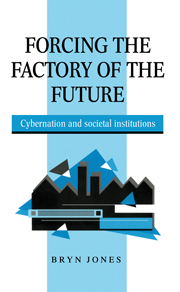Book contents
- Frontmatter
- Contents
- List of figures
- List of tables
- Acknowledgements
- List of acronyms and abbreviations
- Part I The workshop versus the factory
- Part II Technologies of control
- Part III Cybernation and flexibility
- Overview
- 6 The cybernated factory and the American dream
- 7 An American deviant: FMS at Alpha
- 8 Easy-peasy Japanesy: flexible automation in Japan
- 9 Revolution from above: FMS in Britain
- 10 The third Italy and technological dualism
- 11 Conclusion: the struggle continues
- Appendix: sources and methods
- Notes
- Bibliography
- Index
11 - Conclusion: the struggle continues
from Part III - Cybernation and flexibility
Published online by Cambridge University Press: 06 July 2010
- Frontmatter
- Contents
- List of figures
- List of tables
- Acknowledgements
- List of acronyms and abbreviations
- Part I The workshop versus the factory
- Part II Technologies of control
- Part III Cybernation and flexibility
- Overview
- 6 The cybernated factory and the American dream
- 7 An American deviant: FMS at Alpha
- 8 Easy-peasy Japanesy: flexible automation in Japan
- 9 Revolution from above: FMS in Britain
- 10 The third Italy and technological dualism
- 11 Conclusion: the struggle continues
- Appendix: sources and methods
- Notes
- Bibliography
- Index
Summary
This study of the pathology of the metalworking industry began with three questions about recent changes to production processes. Will computer technologies finally establish true factory principles through cybernation of the ‘workshop’ sphere of batch production? Is the emerging organisation a continuation of earlier industrial revolutions, or is it qualitatively different? Are the newer practices sufficiently powerful and universal to transcend the national variations that have developed in the past? These questions required both theoretical and substantive analysis of the technological evolution and social structuring of production organisation. The most fundamental theoretical clarifications concerned the meaning of factory organisation, its historical forms, and the relative influence of technological, organisational and socio-political factors.
Probing the debates over the continuity or discontinuity of technological shifts in manufacturing showed the significance of the analytical categories of Fordism and Taylorism. By revising their conceptual relevance to the problems of batch production in metalworking these categories have been refashioned. The substantive evidence concerned national variations in the pursuit of cybernation, the historical application and modification of Fordist and Taylorist principles, and the interaction of socio-political, economic and technological factors in each society. Together these theoretical refinements and empirical assessments have allowed us to redefine the problems, the past and the likely future of production in the metalworking core of manufacturing.
Conceptual and historical clarifications
Batch production: inside or outside the factory logic?
Asking whether batch production fully departed from the workshop form of organisation challenged the idea of a homogeneous factory institution.
- Type
- Chapter
- Information
- Forcing the Factory of the FutureCybernation and Societal Institutions, pp. 244 - 259Publisher: Cambridge University PressPrint publication year: 1997



